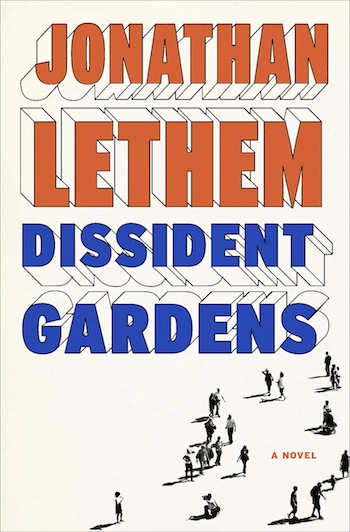Short Fuse Book Review: “Dissident Gardens” — Fantasy Meets Radical Politics
It’s hard to grasp how Jonathan Lethem assimilated all this material — historical and fantastic — and gave it new narrative life in Dissident Gardens, except by granting, to start with, his special genius for absorption.
Dissident Gardens, by Jonathan Lethem. Doubleday, 384 pages, $27.95.
By Harvey Blume
The word is that that Jonathan Lethem’s new novel shows that he’s outgrown the need, manifest in The Fortress of Solitude (2003), among his other fictions, to meld realism with Marvel Comic fabulism. It’s true there’s no one in Dissident Gardens quite like Dylan Ebdus and Mingus Rude, characters who, in The Fortress of Solitude, can fly, or, if in lucky possession of a certain ring, become invisible. Still the fabulous is very much on display in Dissident Gardens, albeit in non-comic book form.
Dissident Gardens is the tale of three generations of a family rooted in radical politics, from the Old Left, to New Leftism of a sort, Quaker pacifism, Occupy, and a brief, misbegotten flirtation with the Third World guerilla approach. Genuine events mold the story, none more than Khrushchev’s 1956 speech about the crimes of Stalin, which proves traumatic for many who had hewed to the Communist Party line, however twisted or opaque.
Suddenly Sunnyside Gardens in Queens, New York, just yesterday a hot bed for Party meetings and organizers, sheds its Red. Rose Zimmer, the great and awful matriarch of Dissident Gardens is now bereft of illusions: “No Trotsky diversions now. . . No Popular Front, no This Guitar Kills Fascists, no Communism is Twentieth-Century Americanism. The true Communist pulled the tab on another tin of sardines in her kitchen.”
Sunnyside Gardens does in fact exist and was, as Lethem writes, designed by “Lewis Mumford borrowing from the Berlin architects’ vision of a garden city, a human environment grounded in deep theory, houses bounded around courtyard gardens, neighbors venting their lives to one another across a shared commons.” Khrushchev’s venting about Stalin takes the air out of Sunnyside’s socializing across the common. Residents who might yesterday have greeted each other as “comrade” at the local library or grocery store suddenly avoid looking each other in the eye.
For some, Khrushchev’s speech is preamble to what’s as bad or worse, namely the Dodgers leaving Brooklyn in 1957. This second calamity may not have resounded all the way to Prague, Warsaw or Beijing but for quite a few in the greater New York area — notably one Lenin aka Lenny Angrush, Rose’s nephew — it signifies that there was no longer a team capable of shouldering the anti-fascist (anyway anti-Yankee) burden: “The mighty correctors of segregated baseball, secret official team of the American Communist Party, now flirted with year-round sunshine.”
Lenny, anyway, does not therefore cease to be a Communist. On the contrary, like Rose, his role model, he now attains to the highest stage of Communism, that of being a Last Communist: “In 1956 Khrushchev wrecked the Soviet illusion and it was at that moment that true Communism had floated free of history, like smoke.” Communism freed from idiotic Party dictates and the implacable hostility of the masses now belongs to raddled, lone, increasingly deracinated types — chess players, screwy academics, and maybe even novelists.
As Rose conceives it, when she defies a Party directive to move to New Jersey to organize farmers, “it was in the parlor that the nascent flame of American revolution could be nurtured, and it was in the bovine calloused imagination of the American worker that it went to flicker and die.” No factory floor activism or chicken farm organizing assignment for Rose. Argument — above all, inner argument — is the proper place for Communism.
Still, in this well-trodden history, as richly and movingly re-imagined by Lethem, there is much room for the fabulous. The fabulous, in fact, is crucial. For example: Miriam, Rose’s formidable teenage daughter, wants to lead a bunch of newly acquired pals from a Greenwich Village folk club, where the likes of the Gogan brothers dully strum, over the Brooklyn Bridge, to the party rumored to be taking place at Norman Mailer’s place. One in that crowd, not keen for the trek to Brooklyn — Lethem denotes this aversion as Boroughphobia — asks how Miriam plans to get them into Mailer’s party.
“How? With my secret Commie powers, of course.”
Saying so, Miriam grasps at once “that her Secret Commie [yes, Commie, not Comic Book] Powers were not actually a joke.”
This is blatant example of Lethem’s resort to the fabulous, an appetizer, whereas Dissident Gardens is anything but a blatant book. As Lethem would have it, the sleep of dialectical reason breeds all manner of fantasy. The realist core of the novel is beset and infected by fictions — from film, music, video games, and, not least of all, television.
For example, Rose is reduced in her last years to a crush on a figure who could not be any more antithetical —Archie Bunker. She conceives of herself on his show, haunts him, among his cronies, at his television tavern, and finds “herself plunging ever deeper into the maze of his charismatic stupidity.” Nor is she put off when Archie refuses to “bandage words” her. The last Commie wants Archie as her last lover: “She wanted to seize his calf-like cheeks in her hands and scream Bubbelah! She wanted to gnaw on his jowls.”

Author Jonathan Lehtem — ever more deeply ensnared in the New York City that is his Yoknapatawpha. Photo: Doubleday.
The abundance of fantasy frames the pathos and the humor of the novel.
Cicero Lookins is the son of Rose’s ex-lover, Douglas Lookins — a black cop who fought in the Battle of the Bulge and become an Eisenhower Republican. The Communist Party had expressly ordered Rose to desist from sleeping with Lookins. In fact, the book begins with this admonition from an Important Communist:
“Quit fucking black cops or get booted from the Communist Party.”
Faced with this choice Rose takes being booted over surrendering control of her sex life. It’s not a simple decision. Outside the context of Communism who is there to appreciate, for example, that, “I once forced a Wobbly to sit down and talk calmly to a Kropotkinite. It may mean nothing to you but worlds hung in the balance at that particular moment in time.”
As the book draws to a close, Rose is in a nursing home, and Cicero Lookins — a mountainous, gay, postmodernist academic best known for his course on Disgust and Proximity, pays some visits. By then Rose is beyond patrolling Sunnyside Gardens, as had been her wont. “She patrolled memories instead, tried to incite against former neighbors and comrades’ — against her betrayers on the library board, against a misguided Zionist grocer who died in 1973, against a Real’s Radish & Pickle shop steward who’d Red-baited her in 1957.”
To Cicero, this Last Communist, who had long ago kindled his own intelligence, confides her final hope:
“What I pine for,” she tells him, “is a bowel movement.”
“The food goes in,” she tells him. “It must come out eventually.”
Cicero says: “I’m sure it has been somehow.”
“No, Cicero,” she objects “I’m being converted into a block of solid human waste. That’s the only explanation.”
There is no one but Cicero to visit her at this point, except, perhaps, so she tells a nurse, this guy called Archie.
Cicero finds that Rose had “begun reminiscing about the Lower East Side, dullish shit regarding icemen and rag pickers, a lover’s career on the Yiddish stage, and he’d thought the fragments weren’t even hers. Rather, it appeared she’d been cribbing from Howe’s World of Our Fathers.
Rose had long ago suppressed all trace of being Jewish — any local accent (she sends Miriam to an elocution class to accomplish the same for her daughter), any hint of the Yiddish her family, the Angrushes (Lethem and his wordplay) spoke amongst themselves in order to turn into a true — denatured and generic — internationalist. She gets her Jewishness back in her last days, distilled from collective memory, cribbed mostly from Irving Howe.
***
Dissident Gardens has its problems. There are times when the propulsive, run-on and occasionally exhausting energy of the prose threatens to occlude events. (A long, satisfying epistolary exchange between Miriam and her father, who long ago decamped to East Germany, shows that Lethem writes very well in a calmer key.) And Dissident Gardens cuts away from, then back to, unfolding events often enough to create a certain anxiety about chronology.
Perhaps my favorite of Lethem’s novels is Motherless Brooklyn but that volume, for all its delicious exuberance, is many times less ambitious than Dissident Gardens. It’s hard to grasp how Lethem assimilated all this material — historical and fantastic — and gave it new narrative life, except by granting, to start with, his special genius for absorption.
When I interviewed Lethem about his novel You Don’t Love Me Yet (2007), he talked about why it was set in L.A. about which he was happy to know nothing. Knowing nothing was a relief. After The Fortress of Solitude (2003), with its deep in the dark of Brooklyn setting, Lethem wanted only to avoid the fate of being the “Faulkner of Dean Street,” the Brooklyn address in Boerum Hill where he was raised and was, again, living.
But Lethem has not completed his escape. To put it another way, he’s overcome his Boroughphobia. With Dissident Gardens he proves himself ever more deeply ensnared in the New York City that is his Yoknapatawpha.
Another Blume interview with Lethem.
Harvey Blume is an author—Ota Benga: The Pygmy At The Zoo—who has published essays, reviews, and interviews widely, in the New York Times, Boston Globe, Agni, The American Prospect, and The Forward, among other venues. His blog in progress, which will archive that material and be a platform for new, is here. He contributes regularly to The Arts Fuse and wants to help it continue to grow into a critical voice to be reckoned with.


